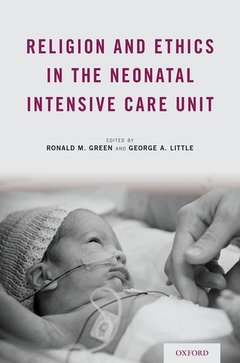Religion and Ethics in the Neonatal Intensive Care Unit
Langue : Anglais
Coordonnateurs : Green Ronald M., Little George A.

Each year, neonatal Intensive care units (NICUs) in the U.S. and around the world help thousands of sick or premature newborns survive. NICUs are committed to the ideals of family-centered care, which encourages shared decision-making between parents and NICU caregivers. In cases of infants with conditions marked by high mortality, morbidity, or great suffering, family-centered care affirms the right of parents to assist in making decisions regarding aggressive treatment for their infant. Often, these parents' difficult and intimate decisions are shaped profoundly by their religious beliefs. In light of this, what precisely are the teachings of the major world religious traditions about the status and care of the premature or sick newborn? Few studies have grappled with what major religious traditions teach about the care of the newborn or how these teachings may bear on parents' decisions. This volume seeks to fill this gap, providing information on religious teachings about the newborn to the multidisciplinary teams of NICU professionals (neonatologists, advance practice nurses, social workers), as well as to parents of NICU patients, and students of bioethics. In chapters dealing with Judaism, Catholicism, Denominational Protestantism, Evangelical Protestantism, African American Protestantism, Sunni and Shi'a Islam, Hinduism, Buddhism, Navajo religion, and Seventh Day Adventism, leading scholars develop the teachings of these traditions on the status, treatment, and ritual accompaniments of care of the premature or sick newborn. This is an essential book that will serve as a first resort for clinicians who need to understand the religious dynamics influencing anyone making a difficult decision about her sick newborn.
Ronald M. Green is Emeritus Professor for the Study of Ethics and Human Values at Dartmouth College. He is a member of the Department of Community and Family Medicine at Dartmouth's Geisel School of Medicine. In 1996 and 1997, Professor Green was the founding director of the Office of Genome Ethics at the National Human Genome Research Institute of the National Institutes of Health. He is the author or editor of thirteen books, including Babies by Design: The Ethics of Genetic Choice (Yale University Press, 2007), and Suffering and Bioethics (co-edited with Nathan Palpant, Oxford University Press, 2014). In 2005, Professor Green was named a Fellow of the John Simon Guggenheim Memorial Foundation. George A. Little is Active Emeritus Professor of Pediatrics and Obstetrics and Gynecology, Geisel School of Medicine at Dartmouth. He completed his clinical training in Pediatrics at the University of Vermont and in Neonatal-Perinatal Medicine at the University of Colorado. He is a Fellow of the American Academy of Pediatrics and an Honorary Fellow of the American College of Obstetrics and Gynecology. He is emeritus Department Chair of Maternal and Child Medicine at the Dartmouth-Hitchcock Medical Center. He was awarded the Virginia Apgar Award of the American Academy of Pediatrics.
Date de parution : 10-2019
Ouvrage de 280 p.
23.9x15.7 cm
Thème de Religion and Ethics in the Neonatal Intensive Care Unit :
© 2024 LAVOISIER S.A.S.



